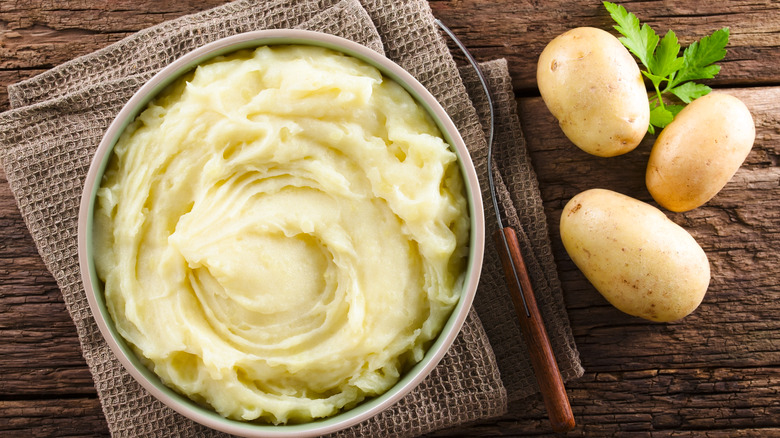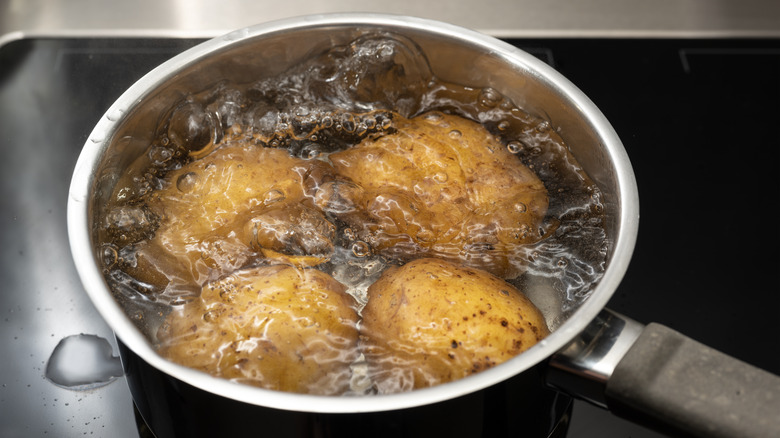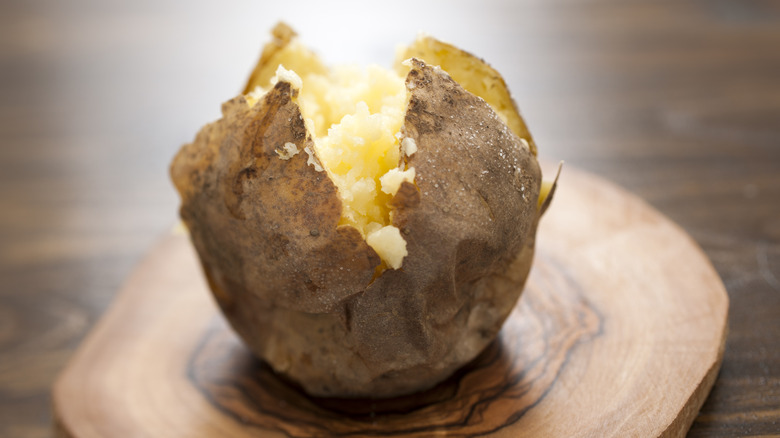Why You Should Bake Your Potatoes Before Mashing
Potatoes are a mainstay of our diets. According to Idaho Potato, Americans eat well over 100 pounds of potatoes every year. It makes sense, they're affordable, filling, delicious, and versatile. It's tough to beat a crispy hashbrown, Truffled French Fries, or even a posh Pommes Aligot recipe but classic mashed are probably the pinnacle of potato dishes. Still, they can go wrong if mishandled. We've all had versions that seem like "wallpaper paste" as Michelin-starred chef Heston Blumethal described it in a video in which he makes light of this error.
Most of us know how to make mashed potatoes. They're simple. But, don't let that simplicity fool you into thinking they're easy to get right. There are all sorts of pitfalls. One type of potato versus the next will yield vastly different results. A mashed potato's texture varies due to how they get mashed. But, the toughest part might just be cooking the potato properly.
As Heston Blumenthal explains, "Up to 25% of the potato can be starch." That isn't a bad thing, that starch is what helps the potato absorb all the butter and cream later in the process. But, if you overcook the potato in water the starch molecules can, "swell up to one hundred times." Those waterlogged starches don't mash into a smooth, fluffy, mash. They'll taste bland, become gluey, and fall well short of something tasty.
Keep water out of your mashed potatoes
So, for great mashed potatoes, you'll need to make sure your potatoes are cooked perfectly. If they spend too much time in the water, that starch can go awry. The window for perfectly boiled potatoes is small, especially as you're multitasking the rest of a meal. Bon Appetit recommends peeling and cutting your potatoes in large pieces to minimize the odds of overcooked spuds. The perfect potato is cooked through but hasn't started to become furry and fall apart.
America's Test Kitchen goes a step further by leaving the potatoes in their skins. That natural barrier is the perfect way to protect the starch from becoming water-logged. Whole, unpeeled potatoes certainly take longer to cook but the overcooked margin of error is massive thanks to those skins.
The downfall? They still need to be peeled. This exercise might be the inspiration for the "hot potato" game, and your favorite inexpensive peeler won't help. Thankfully, they also offer a clever way to get these potatoes peeled without blistering your fingers. Just stab the spud with a fork. That's your handle as you use a paring knife to easily pull away the skin before mashing.
Those are great ways to limit water from spoiling our mashed potatoes. Still worried about swollen spuds? Can you cook a potato without water?
Baked potatoes lead to the best mashed potatoes
Of course you can. Baked potatoes for the win! There's enough moisture in a potato for it to cook though as it simply sits in the oven. There's no chance of waterlogging the potatoes and you can really load up on the butter and cream.
In Huffpost, hotel culinary director Chris Crary explains how they use this baked potato technique. Potatoes are roasted, in their skins, on a bed of salt till tender. Peel and mash while still warm, then add the fat and liquid of your liking. As Bon Appetit suggests, you can flavor that fat by simmering it with some aromatics like garlic cloves or sprigs of herbs. Just strain those out before adding them to the potatoes. The liquid, which can also be infused, should be warm and added in stages. Potatoes can absorb a lot of liquid but if it's added too quickly, they might end up soupy.
Baked potatoes are the key to great mashed potatoes, though both prepared versions make a great addition to many meals. Thankfully, a Classic Baked Potato is easy to make. In a pinch, maybe you could just swing into a Wendy's for a few of their baked potatoes.


